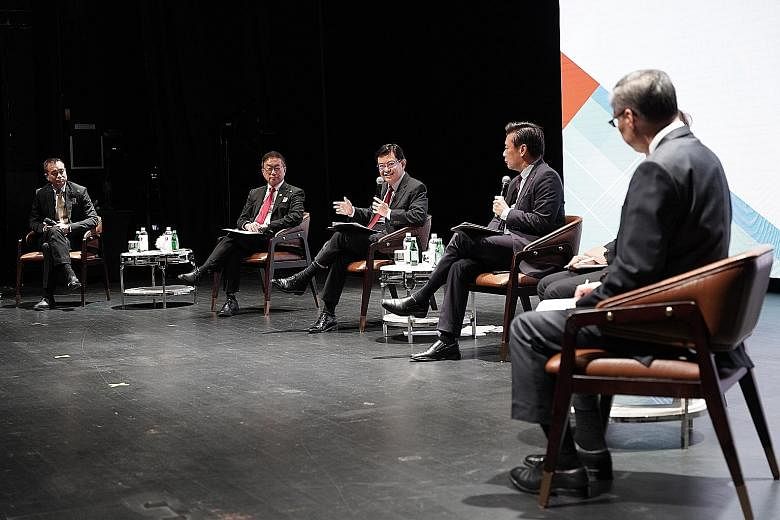Amid the uneven recovery from Covid-19 and stiff global competition for talent, firms must invest in their workers so as to transform and emerge stronger from the pandemic, said Deputy Prime Minister Heng Swee Keat.
At the Lianhe Zaobao Singapore Budget 2021 Business Forum yesterday, Mr Heng, who is also Finance Minister, outlined three ways in which firms and employees can work closely together.
The first is joining the Singapore Together Alliances for Action, which are collaborations that seize growth opportunities for Singapore.
He said these alliances can harness the collective strengths of industry and the community to solve problems more effectively.
Firms should also take a long-term view of the relationship with their staff, by upgrading their skills and increasing their productivity. This, in turn, leads to more competitive industries, he said.
"The next phase of competition is the competition for talent. We must better develop our local talent, as well as attract overseas talent with specialised skills."
He added that firms should also give back to society, observing that many companies had returned or donated their Jobs Support Scheme wage subsidy payouts.
Others stepped forward to help vulnerable communities.
Other panellists at the forum in Mandarin moderated by Lianhe Zaobao editor Goh Sin Teck were Singapore Chinese Chamber of Commerce and Industry president Roland Ng, Singapore Business Federation chairman Lim Ming Yan, Association of Small and Medium Enterprises president Kurt Wee and UOB global economics and markets research executive director Suan Teck Kin.
The forum, into its sixth year, focuses on the outlook of the Budget.
Mr Heng had announced last month that this year's Budget will shift "from containment to restructuring", as Singapore's economy continues to reopen.
The $107 billion plan includes a $11 billion Covid-19 Resilience Package to safeguard public health and support workers and businesses.
A total of $24 billion over the next three years will go towards enabling firms and workers to emerge stronger in the face of structural changes.
Commenting on the ongoing economic uncertainty, Mr Heng said how soon borders reopen depends not just on Singapore, but on whether the world can combat Covid-19 effectively.
"We also need to assess if surrounding countries are undertaking their vaccination programmes just as quickly."
All parties must also be able to agree on the approach, he said.
"We originally thought that there were many countries we could partner with on reciprocal green lanes (RGLs).
"But then some of them experienced a second wave of infections, which made it harder to commit to opening RGLs within a definite timeline."
Another factor adding to the economic uncertainty is US-China tensions.
Mr Heng noted that the US re-joining the World Health Organisation and Paris climate agreement are positive developments that will allow it to play a role in the multilateral system.
He said there are many areas of common interest which the US and China can collaborate on, such as Covid-19 and climate change. The latter is of particular concern to Singapore as it is a small and low-lying island nation.
Responding to an audience member's question on US President Joe Biden's recent signing of a US$1.9 trillion (S$2.6 trillion) Covid-19 rescue package, Mr Heng welcomed it, saying it would have a salutary effect on the global economy.
In response to a question on China's dual circulation growth model, he noted it is an "astute strategy" as China's domestic market is big enough to spur economic development from within, even as it remains tied to other countries.
The strategy places a greater focus on the domestic market, or internal circulation, in order to adapt to an increasingly unstable and hostile outside world.
It is expected to see China rely less on its export-oriented development strategy, or external cir-culation, without abandoning it altogether.
It is not just the two major powers, but also Asean, which must strengthen cooperation, Mr Heng said, adding that the group is critical to the region's stability, and it is important to preserve Asean centrality.
The principle of centrality goes beyond geography, to include Asean's central role in engaging major powers and maintaining the region's security and prosperity.
Going forward, all countries must consider how they can strengthen the resilience of supply chains and production, he said. On its part, Singapore has inked digital economy pacts and invested in research and development.
"We won't know exactly when the returns from these (R&D) investments will be realised - it could be five, 10 years.
"But what is clear is that our investments over these years have seen breakthroughs, especially during this pandemic," he said, citing as an example the Fortitude Sars-CoV-2 and Flu A/B test kit jointly developed by the Agency for Science, Technology and Research, Tan Tock Seng Hospital and local molecular diagnostic company MiRXES.
"The most important thing now is to groom talent... I hope firms can support their workers' skills upgrading, and that everyone uses the (Budget) measures well so that we can emerge stronger together."


